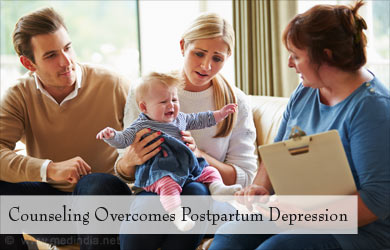- About Postpartum psychosis - (http://www.rcpsych.ac.uk/healthadvice/problemsdisorders/postpartumpsychosis.aspx)
- Postpartum psychosis - (http://www.nhs.uk/conditions/postpartum-psychosis/pages/introduction.aspx#risk)
What is Postpartum Psychosis?
Postpartum psychosis is a term used to describe mental psychosis among certain mothers soon after childbirth. The onset of this form of mental illness is rapid and it is difficult to ascertain how it develops. Mothers who exhibit antenatal depressive episodes have been found to be at a higher risk for postpartum psychosis.
This severe form of mental illness usually develops within a few days to a few weeks after childbirth and is accompanied by varying symptoms that rapidly change. Most mothers go through periods of “baby blues” or postpartum depression after childbirth; however, postpartum psychosis is seldom encountered.
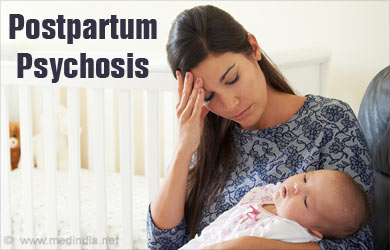
There are marked changes in the mood, perception, thoughts and behaviour of the mother, which warrants immediate medical supervision as the mother is in danger of harming herself. Mood disorders also affect the cognitive abilities of the affected mother.
What are the Known Causes of Postpartum Psychosis?
Postpartum psychosis is caused more due to a combination of factors rather than a single factor and it includes the following:
- Hormones: The extensive hormonal changes that occur during childbirth have been implicated in mood swings and depression.
- Genetic predisposition: Some people are more prone to this disorder when compared to others. As there is a genetic basis for this illness, mothers who have relatives who suffered from the same disease are more likely to suffer from this disorder themselves.
- Previous episode of postpartum psychosis: If the mother suffered from postpartum psychosis after the birth of a previous child then the chances of recurrence after subsequent births are high.
- Previous history of bipolar disorder or schizophrenia: Mothers with previously diagnosed condition of schizophrenia or bipolar disorders have a higher chance of suffering from postpartum psychosis.
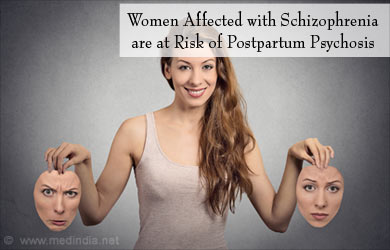
- Sleep inadequacy: Poor sleep patterns during pregnancy and soon after childbirth have been associated with postpartum psychosis in certain instances.
- Poor emotional state: Low self-esteem or feeling of being inadequate as a mother or problems with the spouse can also be a trigger for postpartum psychosis.
It is important to note that a single factor is seldom the reason behind an episode of postpartum psychosis and it’s usually a combination of factors, making it impossible to ascertain the preconditions of the disorder.
What are the Symptoms of Postpartum Psychosis?
The symptoms may develop a couple of days after childbirth or even after 12 weeks. When a mother suffers from postpartum psychosis, it leads to distress for the mother as well as for her family. The symptoms include:
- Excessive mood swings
- Manic obsessions
- Delusions
- Hallucinations where the mother believes that she can hear voices and see specific situations.
- Paranoid behaviour like believing that people are trying to harm her baby
- Hyperactive behaviour at times or excessively irritable with others
- Sudden overpowering feeling of being undefeatable or extremely strong
- Difficulty in focusing leading to inability in completing a task
- Inability to sleep
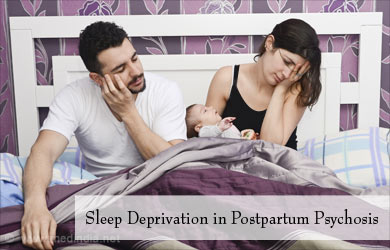
The mother displays a dramatic shift in moods, with irritability in one instance and profound anger or sadness the next. These manic situations are potentially risky where the mother could harm herself or those around, including her baby.
The risk of maternal suicide increases 70 times during the first year after childbirth for a person with postpartum psychosis and is the leading cause of maternal death post delivery. The mother is less likely to harm the baby than herself as the mother is prone to feel inadequate and fails to look after the baby rather than actively causing harm to the baby. However, there have been instances of homicidal behaviour towards the baby or other children.
How is Postpartum Psychosis Detected?
Patients with previous history of bipolar disorder or schizophrenia are asked to watch out for symptoms while doctors check for potential signs among high-risk patients during the 6 weeks check up.
The Edinburgh Postnatal Depression Scale (EPDS) and the Mood Disorder Questionnaire(MDQ) are administered to patients and their condition is evaluated based on their score.
What is the Treatment for Postpartum Psychosis?
Postpartum psychosis should be considered an emergency and the patient should be rushed to the doctor in order to prevent any harm that may be caused by the patient.
The following treatment programme will be provided for the patient during hospitalisation:
- Education: The patient as well as family members will be detailed about the symptoms, outcomes and methods to prevent recurrence to help provide a suitable environment for the patient to recover.
- Organic causes will be reduced /eliminated: Organic causes like family stress and low self-esteem will be reduced or eliminated through focussed counselling sessions and essential family support.
- Pharmacotherapy: Postpartum psychosis is a psychological disorder and will require the administration of drugs to help the patient recover. During hospitalisation, the patient will be provided with specific drugs that will help them recover.
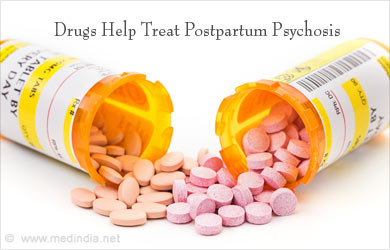
- Supportive therapy: Parenting tips and supportive therapy to help the mothers cope with parenting and to encourage mother-child bonding will be provided.
- Continuous assessment of patient functioning: The patient will be monitored and assessed periodically to determine recovery and to understand safety status.
The patient may still have to take prescribed medication even after she is fit enough to leave the hospital. An attendant may also have to be with the patient at all times to prevent harm to the patient or the baby. In severe cases, the patient will be advised to refrain from having any more children.
Treatment is essential not only to prevent personal harm but also to provide the right environment for a child’s physical and emotional well-being. There are several intervention strategies that help parental depression.
What is the Prognosis for a Patient Suffering from Postpartum Psychosis?
After treatment, women begin to recover fast, though they go through a period of anxiety and depression and a failure to bond with their baby. However, with good family support and the right medical care, they recover rapidly.
In a study published by Nager A and colleagues titled “High lifelong relapse rate of psychiatric disorders among women with postpartum psychosis” in the Nordic Journal of Psychiatry in 2006, the researchers concluded that postpartum psychosis is a part of recurring psychological disorders that could occur lifelong. The patient and family members should therefore be sensitive to the patient’s needs to help care for and prevent alarming episodes in the future.
Do Men also Suffer from Postpartum Psychosis?
Men have also been found to suffer from postpartum psychosis and require family support and care just like women do. It is very important to treat both maternal as well as paternal postpartum psychosis as it is equally harmful irrespective of which parent it is.
How to Prevent Postpartum Psychosis?
Postpartum psychosis can be controlled with careful medical supervision if the mother reaches out for help. Owing to a large amount of stigma associated with the condition, most mothers hesitate to seek help, therefore, denying themselves the chance to lead a normal life and to share a loving bond with their newborn.
In a study titled “Prevention of Postpartum psychosis and mania in high-risk women” published in the American Journal of Psychiatry, it was found that high-risk women(women who suffered from postpartum psychosis earlier) who consumed Lithium soon after delivery considerably lowered their chances of a relapse of postpartum psychosis when compared with high-risk women who did not.
Some of the other factors that could help in lowering the chances of an episode of postpartum psychosis include:
- Sufficient sleep
- Support from family to care for the baby
- Counselling on ways to care for the baby
